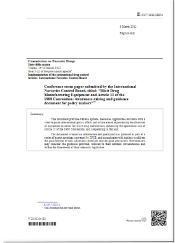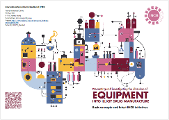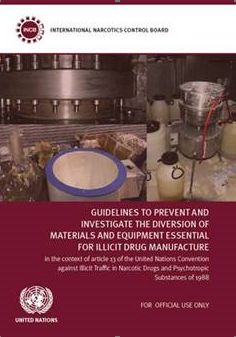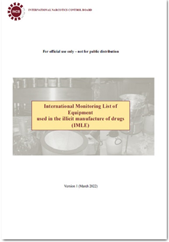Materials and Equipment
Illicit drug manufacture not only requires precursor chemicals, it also requires equipment such as specialized glassware, tableting machines, or other hardware employed in the "cooking" process. Article 13 of the 1988 Convention calls Governments to take appropriate measures to prevent trade in and the diversion of materials and equipment for illicit drug manufacture, and to cooperate to this end.
The Board believes that article 13 is a valuable complementary tool in addressing illicit drug manufacture. However, it is currently underutilized. The present page aims at consolidating information that may assist Governments in increasing the use of article 13 and preventing specialized equipment from reaching illicit laboratories.
More information on the implementation of article 13 →
Resources
Interactive overview of INCB tools and resources related to equipment used in illicit drug manufacture

|
Download the interactive compendium
(multi-page)
-
|

|
Global repository of national approaches on equipment used illicit drug manufactureThe repository contains existing national approaches or regulation in relation to the implementation of article 13 of the 1988 Convention and provides sources for additional information. The list is not exhaustive and is being updated as additional information is made available to INCB.
|
|
|
Brochure of Preventing and Investigating the diversion of certain Equipment into Illicit drug manufactureThe Brochure provides basic concepts and INCB latest and future initiatives related to preventing and investigating the diversion of certain equipment into illicit drug manufacture.
|
|
|
Technical Report on ILLICIT DRUG MANUFACTURING EQUIPMENT and article 13 of the United Nations Convention against Illicit Traffic in Narcotic Drugs and Psychotropic Substances of 1988This document provides a situation analysis related to equipment used in the illicit manufacture of drugs, in the context of article 13. It contains information about the regulatory framework provided by the 1988 Convention and relevant resolutions, action taken by Governments and by the Board, and an analysis of current trends and developments as well as conclusions and recommendations for Governments on the implementation of article 13 of the 1988 Convention.
Download 2025 edition
|
|
|
Guidelines to prevent trade in and the diversion of essential equipment for illicit drug manufactureThe guidelines may assist Governments in increasing the operational use of article 13 of the 1988 Convention by taking appropriate measures to prevent and investigate the diversion of equipment for use in the illicit manufacture of drugs.
Copies for official use, in Arabic, Chinese, English, French, Russian and Spanish, are available at: incb.precursors@un.org
|

|
Awareness-raising and guidance document for policy makers: Illicit Drug Manufacturing Equipment and Article 13 of the 1988 ConventionThis document provides various options, measures, approaches and tools with a view to guide international policy efforts and action aimed at preventing the diversion of equipment essential for illicit drug manufacture, enhancing the operational use of article 13 of the 1988 Convention, and cooperating to that end. Governments may consider the guidance provided, tailored to their national circumstances and within the framework of their domestic legislation. The document was prepared for the March 2022 session of the Commission on Narcotic Drugs and is available as a conference room paper. Download
|
|
|
The International Monitoring List of Equipment used in the illicit manufacture of drugs (IMLE)The international monitoring list of equipment (IMLE) includes certain items of equipment of international relevance and for which substantial evidence exists of their use in the illicit manufacture of narcotic drugs, psychotropic substances, new psychoactive substances and precursors. Copies for official use are available at: incb.precursors@un.org |



